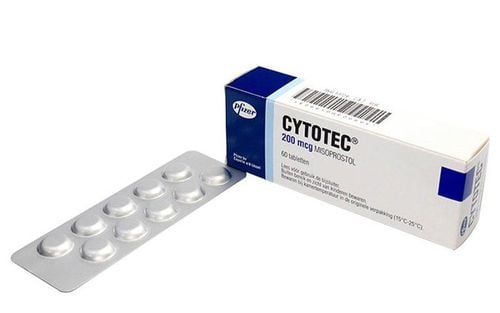This is an automatically translated article.
Imipar is a medicine used in the treatment of gastroesophageal reflux disease. The drug is classified in the list of gastrointestinal drugs with the main active ingredient being Rabenprazole, which is prepared in the form of lyophilized powder for injection. Imipar is only used by patients when prescribed by a doctor.
1. What is Imipar?
Drug Imipar belongs to the group of gastrointestinal drugs, often used in the treatment of gastric acid secretion, gastroesophageal reflux disease (GERD), peptic ulcers. The main ingredients of the drug include Rabeprzole in the form of Rabeprazole Sodium 20mg, which is prepared in the form of lyophilized powder for injection, contained in a vial.
Pharmacodynamics: About the main ingredient Rabeprazole of Imipar, this is a substance that inhibits basic gastric secretion and in an excited state. This active ingredient will inhibit the enzyme H+/K+-ATPase in the parietal cells of the stomach lining, which is an enzyme that pumps acids, hydrogen and protons in the intestinal environment. Rabeprazole binds to this enzyme and works to stop the last stage of gastric secretion, thereby stopping acid secretion in the stomach.
2. Effects of Imipar
Imipar drug with the main ingredient Rabeprazole will inhibit gastric acid secretion within 1 hour after the patient injects the drug. In patients with peptic ulcer disease, the effect of Imipar was also evident when it improved significantly in experimental gastric mucosal lesions caused by cold stress, pyloric ligation or excessive alcohol consumption.
2.1. Indications for use Imipar Treatment of advanced gastric ulcers with bleeding or erosion Treatment of active duodenal ulcers with bleeding or erosion Treatment of severe ulcerative or erosive gastroesophageal reflux disease (GORD/GERD) Treatment of non-erosive reflux disease (NERD) but the patient does not take oral medication Prophylaxis of acid aspiration during surgery Patients with damage to the gastric mucosa due to stress 2.2. Imipar is contraindicated in patients with a history of hypersensitivity to rabeprazole, benzimidazole or other components of the drug Do not use Imipar during pregnancy or lactation For patients with dysfunction Severe liver function, using Imipar drug requires the indication and monitoring of a doctor. Imipar medicine reduces the symptoms of gastric acid secretion, but cannot prevent gastric and esophageal malignancy. Therefore, in patients with gastric and esophageal malignancy, Imipar is also not recommended.
3. Dosage of Imipar
The recommended dose of Imipar is as follows:
Recommended dose for adults: 20mg Imipar/day, administered by slow intravenous injection or intravenous infusion over 20-30 minutes. The drug is used within 7-10 days. Dosage of Imipar for the elderly: For the elderly with active duodenal ulcer and progressive benign gastric ulcer, the dose is 20mg once a day in the morning. Dosing Imipar within 4 weeks recorded most patients healed ulcers. In some cases, after 4 weeks, the ulcer has not healed, it takes 4-6 more weeks of treatment to be effective. Dosage for patients with gastroesophageal reflux disease with ulcers: 20mg/day, used for 4-8 weeks. Maintenance dose in gastroesophageal reflux disease: maintenance dose 10-20mg/day, used within 12 months. Dosage for prevention of acid aspiration in surgery, treatment of mucosal damage caused by stress in intensive care, head injury: 20mg/time/day. Dosage for patients with duodenal ulcer and benign gastric ulcer with H. Pylori: Imipar 20mg/time, 2 times a day, combined with antibiotic clarithromycin 500mg/time, twice daily and amoxicillin 1g/time, daily 2 times. Patients take the drug in the morning and evening, the treatment period is 7 days. The use of Rabeprazole in combination with amoxicillin and clarithromycin did not show any adverse effects and unusual symptoms.
4. Notes when using Imipar
Notes when using Imipar as follows:
There are no documents that record the use of Imipar in children, so parents should not arbitrarily use Imipar for children. For pregnant women: Imipar should only be used when absolutely necessary and prescribed by a doctor. For nursing women: There have been reported adverse reactions from breastfed children from mothers who have used Rabeprazole, Therefore, Imipar should not be used in nursing women.
5. Side effects of Imipar
Side effects of Imipar are well documented in short and long studies. Below is a summary of the symptoms when using Imipar
The most noticeable symptoms on the skin are rash, itching, urticaria and hair loss. Body as a whole: Asthenia with fever, allergies, chills, pain in the chest area below the bones, the patient may be sensitive to light in some cases. Musculoskeletal system: myalgia, arthralgia, bursitis Cardiovascular system: Hypertension, abnormal electrocardiogram, angina, sinus bradycardia, increased heart rate. Respiratory system: shortness of breath, asthma, blue bleeding, hiccups Digestive system: Digestive disorders, diarrhea, vomiting, dry mouth, rectal bleeding, sometimes black stools, loss of appetite, glossitis, gingivitis, proctitis. Endocrine system: Hyperthyroidism, hypothyroidism Blood and lymphatic system: Lymph node disease, anemia Urinary and genitourinary system: Cystitis, dysuria, uterine bleeding, polyuria. Weight gain, dehydration, peripheral edema Imipar drug with the main active ingredient is Rabeprazole, used in the treatment of diseases related to gastric ulcers and gastric acid secretion. The drug is prepared in the form of a powder for injection, used only as prescribed by a doctor. The drug Imipar includes many side effects, so patients should carefully understand the information to use the drug properly and effectively.
Follow Vinmec International General Hospital website to get more health, nutrition and beauty information to protect the health of yourself and your loved ones in your family.
Please dial HOTLINE for more information or register for an appointment HERE. Download MyVinmec app to make appointments faster and to manage your bookings easily.













